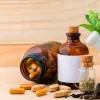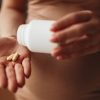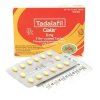- Empty cart.
- Continue Shopping
What Causes High Sex Drive in Females?

Sex drive heightened in females may be enjoyable and exhilarating at most times. Unfortunately, it can amount to confusion. Apart from the straightforward increase and decrease of hormones in males, libido in females has many physiological, psychological, and social interactions. Understanding these issues is crucial.
The Hormonal Influence and Fluctuation
The hormone is in charge of controlling the sexual desire in a female. Estrogen and testosterone, even lower in amount than those of males, stimulate sexual appetite. Changes in these hormones lead to frequent changes in sex drive.
- Ovulation:
Estrogen increases during ovulation and also increases libido. It is nature’s way of promoting procreation.
- Hormonal Changes:
Such hormonal changes as those that occur during menstruation, pregnancy, and menopause have a decreasing or increasing tendency to influence sexual desire, which positively or negatively influences the behaviour of a person.
- Medical Conditions:
Conditions caused by hormonal imbalance, such as polycystic ovary syndrome (PCOS), may raise the level of testosterone in a woman, resulting in increased sexual urge.
- Psychological and Emotional Factors
A woman’s sexual desire is closely associated with her mental and emotional stability. Stress, anxiety, and depression have effects on sexual overtures.
- Relationship Satisfaction:
Strong and loving relationships produce feelings of security and intimacy that boost libido.
- Emotional Link:
Emotional intimacy and connection form the basis on which many women hinge on sexual desire.
- Mental Health:
Untreated mental health conditions can spoil libido. On the contrary, some people experience increased desire during mania in the bipolar disorder cycle.
Lifestyle and External Stimuli
In addition, external and lifestyle-related factors are fluctuation elements in female libido.
- Diet and Exercise:
Exercise with a balanced diet can enhance general wellness in the organism and increase libido.
- Medication:
Many kinds of medications, such as some antidepressants, may have side effects on sexual desire. Some other drugs may boost it.
- Substance Use:
Excessive alcohol and drug consumption can lead to deterioration in sexual functions and the desire to engage in sex.
- External Stimuli:
Exposure to sexually stimulating materials or experiences can temporarily enhance libido.
Potential Libido Boosters
If you’re looking for some potential libido boosters, a private consultation with your healthcare provider regarding taking them should come first before you use any supplements or drugs. The healthcare provider will judge your situation and offer advice on options that work. Examples of potential libido-supporting products include:
- Herbal Supplements:
Some types of herbal supplements, fenugreek or maca, are promoted as sexual desire stimulants.
- Hormone Replacement Therapy (HRT):
HRT therapy is one of the treatments at which menopausal women may expect improvement of symptoms, such as reduced libido concerning hormone sensitivity of menopause.
- Lubricants:
Lubricants can supplement comfort in sexual activity and thereby improve it, which will benefit the libido indirectly.
Conclusion
The causes of high sex drive in females are diverse and interconnected. Hormonal fluctuations, psychological factors, and lifestyle choices all play a role in shaping a woman’s sexual desire. Always seek the opinion of qualified medical personnel before making any health-related decisions.




